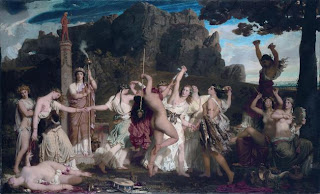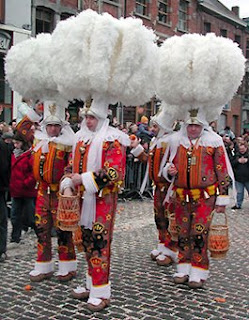
drums vibrate facades, not beat out the rhythm, the brass trumpet to kill head seeming to announce the return of the sun. The bright colors are mixed in the masked dances, which is which? Which is what this day is forgotten the facades of everyday life for daring, perhaps, under cover of disguise what our inhibitions prevent us to do our customary clothes.
It's party time! The madness is allowed, let out the devils within us all, dance, laugh in these colors blatant free rein to let our wild instincts.
El carnival, spring returns, ... Old Man Winter is going to leave that place great Belenos Day by day shines longer and longer and warm our bodies and our minds asleep by cold and long winter night.

When was the festivities, what is the origin of carnival?
It is difficult to answer accurately, but some historians agree to link with the bacchanalian carnival celebrations, festivals celebrated in ancient times almost to the same period the year period was also to this time the start of the new year. These sexual orgies and alcohol in honor of Bacchus.

Bacchus is the Roman counterpart of Dionysus much older. God's very special. Born of Zeus and a princess, this one is dying of want to see the god of gods in its true image, her future child still developing in her womb. Zeus the fetus and then recovered with the help of Hermes inserts it into her thigh or it will eventually build and to be born from the thigh of his father (born from the thigh of Jupiter) is called for that, sometimes, the twice born.
Dionysus is well known for being the god of wine (but it seems that this award is belated, it is more vraissemblable it was before god beer). It is also the god of secretion (blood, semen, milk, urine), the god of fermentation, but especially the god of theater and more specifically the tragedy and comedy. (There are already some adventure or character dress up around the myth of Dionysus), but also the god of death and rebirth and ecstasy. The celebrations in honor of Dionysus who became the Bacchanalia (which seems to be a degeneration of a celebration of the Dionysian mysteries, life and death through ecstasy. The procession bacchantes of Sylena and satyr is orchestrated by the god Pan, god just as interesting. That in a nutshell, I'd be more detailed article about these two gods soon.
But we also find this kind of festivity in other traditions, festivals of Isis in Egypt or spells in Hebrew. The first
sources some of the carnival are celebrated by the Roman Saturnalia, or even in those days people were marching in the streets hidden in chariots decorated.
year for former did not start in January but in March. Before the reconstruction of a new year, it must pass through the chaos, the former already believed the cycle of life of chaos and organization. The carnival was then that period of chaos, festivals, or dance and drink alcohol disrupted the senses. Social order was also disrupted: we see in ancient times, the slave masters and become slaves to become master for five days. It then makes what is usually prohibited.
The colorful confetti were launched in ancient seeds thrown in a sign of fertility.
masks create an anonymity that allows to avoid the gaze of others and free themselves from social inhibitions. There are more than social status or hierarchy. Under the mask, the mask can fall and can then be really make the experience itself. The choice of mask and costume to its importance as the dress is a reflection of our inner ...

In some areas the carnival festivities end with the firing of the snowman, a large wooden figure which is set on fire, burning the winter and then left up to the renewal springlike.

Influenced Christian Carnival is Mardi Gras, the last day where we can eat meat before Lent is a period of restriction which prepares for Passover.
I think we can conclude by saying that the carnival festivities today are the links of a long chain of the universal celebration of spring.
We discuss on the forum circle of history and spirituality
0 comments:
Post a Comment